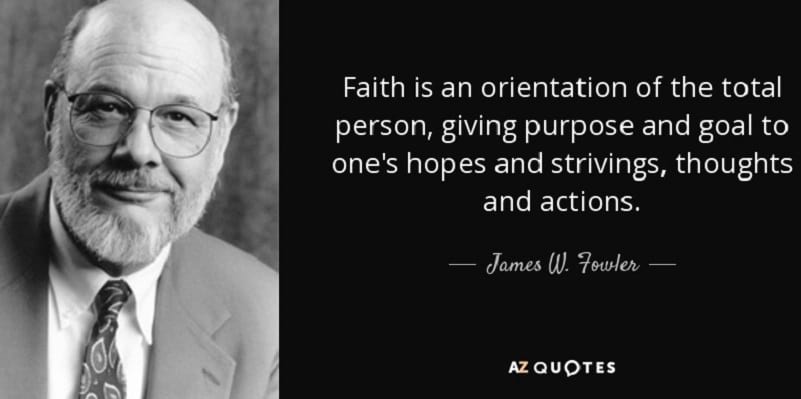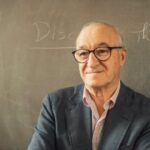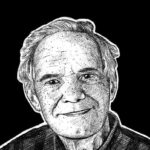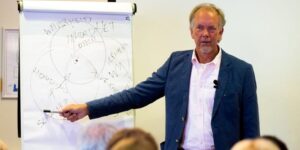James Fowler biography and books

James Fowler (James William Fowler III : October 12, 1940 – October 16, 2015) was an American theologian and professor of theology and human development at Emory University. James Fowler was furthermore a pastor in the United Methodist Church. And he was also director of both the Center for Research on Faith and Moral Development, and the Center for Ethics.
He is best known for his model of the Stages of Faith, which he published in his 1981 book Stages of faith: The psychology of human development and the quest for meaning. In this book, he explained the idea of a developmental process in human faith.
James Fowler biography
Youth
James Fowler was born in Reidsville, North Carolina. He was also known as Jim. His father was a pastor and served several smaller churches in the region. Mother Lucile May Haworth came from a Quakers family. Both of James’ parents went through the Great Depression and struggled to navigate their way through it. His father worked in the hospitality industry, polished shoes and worked in a barbershop.
The Fowler family consisted of James’ sister Margaret, grandmother Smythie Hadley Haworth, older cousin Arthur Stuart and second sister Nina Elizabeth. His grandmother had no house of her own and lived alternately with her four children. While staying at Fowler’s family, she taught James early school lessons. She had been a teacher before that.
He later wrote about his grandmother being the reason he went to study history. Her fascination with history largely stemmed from her stories about life and past times. He always listened carefully to the stories, which is an important part of his later Stages of Faith theory.
During his youth, United Methodist ministers were reassigned every four years. This meant that he had to move regularly with the family. He was born in Reidsville, two years later he moved to Concord, then to Spruce Pine and then to Forest City. Only later did he realize the sacrifices he had to make. He wrote: “I had to cauterize my heart in leaving behind good friends”.
When James was thirteen years old, the family finally settled in one place. Father was appointed director of a Methodist Church conference center in the Waynesville, North Carolina area. During the summer months, the center was filled with visitors from the region, attracted by well-known pastors, teachers and programs. This situation remained the same until James graduated from high school.
During the summer months he spent a lot of time at Lake Januluska. He worked on the maintenance crew and participated in Lake activities including singing. During the regular school year he was very involved in school. For example, he was a member of the choir, played in the band and on the football team. He also served on the student board.
Education
James Fowler graduated from Duke University in 1958. He graduated there with an Angier B. Duke Scholarship. In the first year of his studies, he was elected president of the freshman class. He later became president of the Men’s Student Government Association.
In the first year, he formed a close friendship with Lawrence McClesky and Ronnie Johnson. Together they founded their own fraternity, something that was very popular at Duke University. They called the fraternity The Holy Club. Fowler studied history and eventually wrote a thesis on the provisional government of Russia after the fall of the Tsarist regime.
After his sophomore year, he returned to Lake Junaluska for the summer to resume his work on the maintenance crew. Here he met Lurline Locklear, the woman he would later marry. She was from Monks Corner and worked in a lakeside cafeteria. She was a year older than Jim and had a master’s degree at Duke Divinity School. They got married after graduation.
Lurline became an important person in James’ professional life, as well as a loving wife and caring mother to their two children Joan and Margaret. Their children were raised Christian, and she continually challenged James to consider the implications of his research on faith development.
When he graduated from Duke University, he enrolled at Drew University’s School of Theology. During this period Fowler became acquainted with the work of Berhard Ebeling, a German theologian and proponent of the new hermeneutics.
During his senior year at Drew University, Fowler was admitted to Harvard University. After graduating, he therefore moved to Cambridge. The program he followed was interdisciplinary and had a major influence on how he would come to work as a practical theologian, ethicist and researcher in the field of human development.
He studied with very good scientists such as James Luther Adams, John Rawls, Wilfred Cantwell Smith and Judith Shklar. His dissertation focused on H. Richard Niebuhr’s Ethics and Theology of God, which was published as To See The Kingdom: The Theological Vision of H. Richard Niebuhr. It provided him with important theological and ethical concepts that would later prove very valuable in developing his theory of faith development.
During the early stages of his graduation, Fowler received an invitation from Carlyle Marney to join the staff at Interpreter’s House. Marney was a preacher with a Ph.D from Baptist Theological Seminary in Louisville. Here, he helped lead intensive retreats for ministers to share their life stories. Here he learned important lessons about life. He came to appreciate the power of listening carefully to life stories and he came to believe that overlapping patterns were present in these stories.
The theory development of the Stages of Faith
He also developed a deeper understanding of Erik Erikson ‘s Stages of Development. His theory of ego development proved to be an important part of his later theory of faith development, as did Jean Piaget’s theory of cognitive development.
Building on the work of Erik Erikson, Jean Piaget and Niebuhr, Fowler developed the model for faith development. He worked with several people before that, including Lawrence Kohlberg. In the years that followed, he conducted a large number of studies of faith development in various contexts, including pastoral care and alcoholics anonymous.
He wrote 10 other books and published or edited more than 60 contributing articles in the fields of practical theology and theological ethics. He furthermore received the Oskar Pfister Award for his lasting contributions to the dialogue between religion and psychiatry. He was also awarded the William James Award for his contributions advancing the psychology of religion.
Fowler was also director of both the Center for Research on Faith and Moral Development, and the Center for Ethics.
Famous quotes
- “When we are grasped by the vision of a center of value and power more luminous, more inclusive and more true than that to which we are devoted, we initially experience the new as the enemy or the slayer – that which destroys our “god.” Alfred North Whitehead wrote, “Religion is the transition from God the Void to God the Enemy, and from God the Enemy to God the Companion.” Only with death of our previous image can a new and more adequate one arise.”
- “In German one of the terms for imagination is the compound word Einbildungskraft: literally, the “power (Kraft)” of “forming (Bildung)” into “one (Ein).” Here I want us to reflect about faith as a kind of imagination. Faith forms a way of seeing our everyday life in relation to holistic images of what we may call the ultimate environment. Human action always involves responses and initiatives. We shape our action ( our responses and initiatives) in accordance with what we see to be going on. We seek to fit our actions into, or oppose them to , larger patterns of action and meaning. Faith, in its binding us to centers of value and power and in its triadic joining of us into communities of shared trusts and loyalties, gives forms and content to our imaging of an ultimate environment.”
- “Faith, in its forming of images of the ultimate environment, never finds analogues that fully or with complete accuracy bring out and express its knowing.”
- “Frequently I remember something H. Richard Niebuhr wrote after having spent a number years trying to formulate a comprehensive perspective on faith. He likens faith to a cube. From any one angle of vision, he points out, the observer can see and describe at least three sides of the cube. But the cube has back sides, a bottom and insides as well. Several angles of vision have to be coordinated simultaneously to do any real justice in a characterization of faith.”
- “The limitations of literalness and an excessive reliance upon reciprocity as a principle for constructing an ultimate environment can result either in an overcontrolling, stilted perfectionism or “works righteousness” or in their opposite, an abasing sense of badness embraced because of mistreatment, neglect or the apparent disfavor of significant others.”
Publications and books by James Fowler et al.
- 2006. Stages of faith from infancy through adolescence: Reflections on three decades of faith development theory. The handbook of spiritual development in childhood and adolescence, 34-45.
- 2004. Manual for faith development research.
- 2004. Stages of faith and identity: Birth to teens. Child and Adolescent Psychiatric Clinics, 13(1), 17-33.
- 2004. Faith development at 30: Naming the challenges of faith in a new millennium. Religious Education, 99(4), 405-421.
- 2001. Weaving the new creation: Stages of faith and the public church. Wipf and Stock Publishers.
- 2001. To see the kingdom: The theological vision of H. Richard Niebuhr. Wipf and Stock Publishers.
- 2001. Faith development theory and the postmodern challenges. The International Journal for the Psychology of Religion, 11(3), 159-172.
- 1999. Becoming adult, becoming Christian: Adult development and Christian faith. John Wiley & Sons.
- 1996. Faithful change: The personal and public challenges of postmodern life. Abingdon Press.
- 1996. Pluralism and oneness in religious experience: William James, faith-development theory, and clinical practice.
- 1995. Stages of Faith: The Psychology of Human Development and the Quest for Meaning. HarperCollins Publishers
- 1993. Alcoholics Anonymous and faith development.
- 1991. Stages in faith consciousness. New Directions for Child and Adolescent Development, 1991(52), 27-45.
- 1989. Faith development in early childhood. Rowman & Littlefield.
- 1987. Faith development and pastoral care. Fortress press.
- 1985. Practical theology and theological education: Some models and questions. Theology Today, 42(1), 43-58.
- 1981. Stages of faith: The psychology of human development and the quest for meaning. San Francisco: Harper & Row.
- 1974. Toward a developmental perspective on faith. Religious Education, 69(2), 207-219.
How to cite this article:
Janse, B. (2022). James Fowler. Retrieved [insert date] from Toolshero: https://www.toolshero.com/toolsheroes/james-fowler/
Original publication date: 06/27/2022 | Last update: 04/13/2023
Add a link to this page on your website:
<a href=”https://www.toolshero.com/toolsheroes/james-fowler/”>Toolshero: James Fowler</a>











